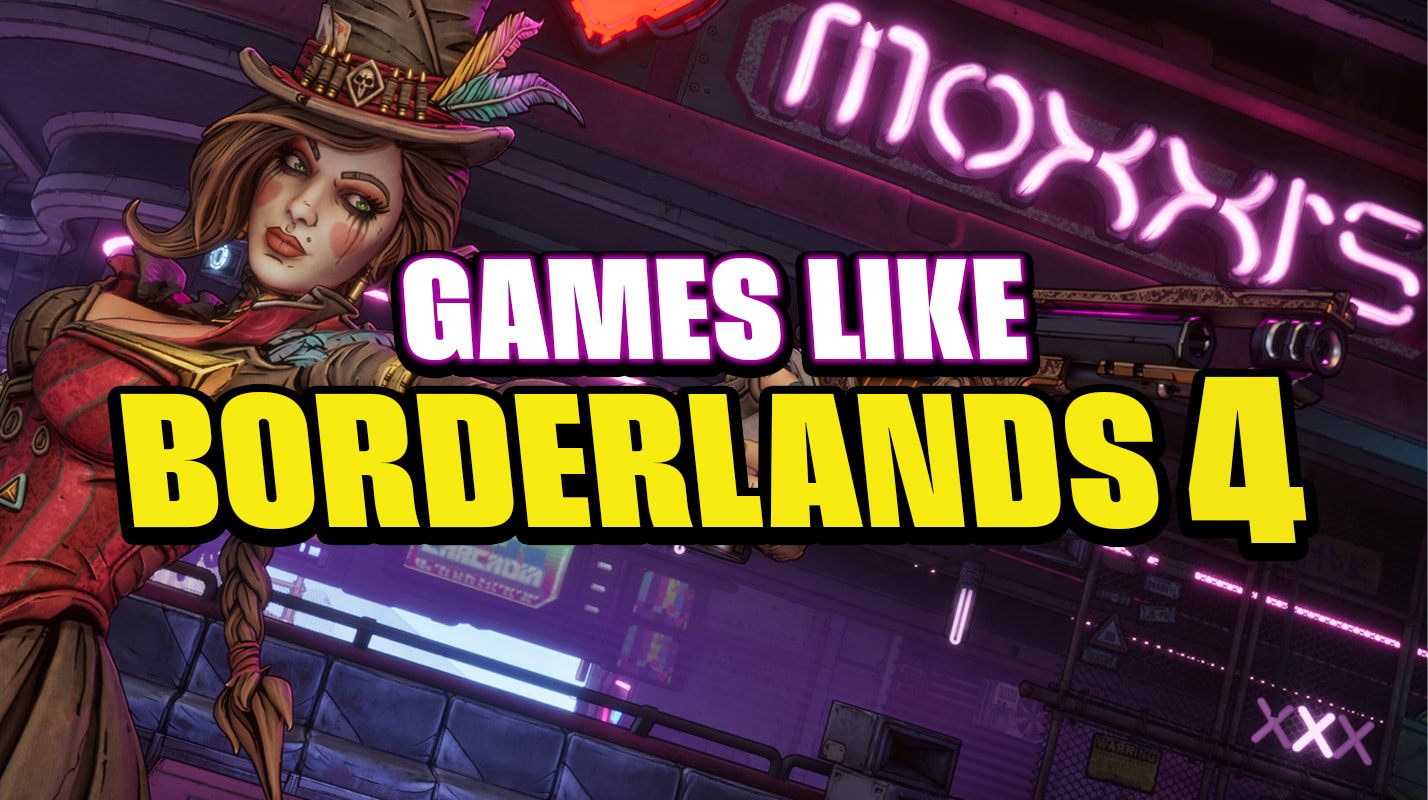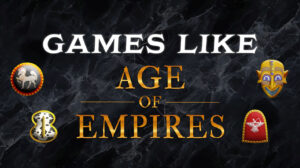All of The Walking Dead Games in Order: Franchise’s Guide in 2025
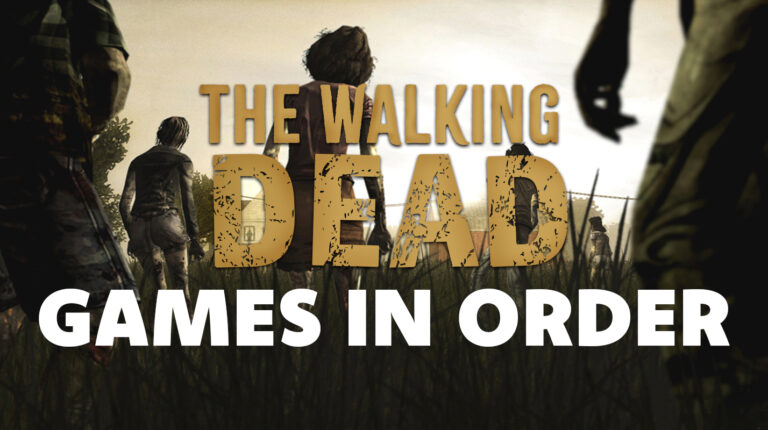
Trying to piece together The Walking Dead games in order can feel like untangling a zombie’s mess of chains. Over the years, we’ve had heartbreaking Telltale stories, unexpected mobile spin-offs, and even VR nightmares – and it’s easy to lose track of what came first. That’s where this guide comes in. Instead of working it out yourself, I’ve lined up every single release in the exact order they dropped.
So whether you’re chasing Clementine’s story from the beginning or just curious about the lesser-known titles, here’s your roadmap through the apocalypse.
Jump to:
Our Top Picks for The Walking Dead Games in Order
With so many Walking Dead titles out there, it can be tough to know which ones are truly worth your time. Here are my top 5 picks that every fan should try first before diving into the complete release order.
- The Walking Dead: Season One (2012) – No surprises here. Telltale’s debut season redefined what narrative games could be. It’s emotional, unforgettable, and remains the crown jewel of the series. If you play only one Walking Dead game, make it this one.
- The Walking Dead: Season Two (2013) – Clementine steps into the spotlight, and the storytelling only gets darker and more impactful. This sequel doesn’t just live up to Season One—it proves the series wasn’t a one-hit wonder.
- The Walking Dead: The Final Season (2018) – A powerful conclusion to Clementine’s journey. With stronger visuals, better pacing, and a satisfying emotional payoff, it ties the saga together beautifully. Fans consider it one of the best send-offs in gaming.
- The Walking Dead: Saints & Sinners (2020) – VR done right. Instead of a gimmick, this game offers visceral combat, deep survival mechanics, and real tension. It’s widely praised as one of the best VR survival experiences, Walking Dead or otherwise.
- The Walking Dead: Michonne (2016) – A short but sharp miniseries that lets you step into one of the most iconic TV characters. While briefer than the mainline games, its focused story and emotional depth make it stand out.
These five are, in my opinion, the best entry points into the series. But of course, they’re only part of the larger story. Keep scrolling to see the full list of The Walking Dead games in order, so you won’t miss a single piece of the franchise.
20 The Walking Dead Games in Order – Full Franchise List
From story-driven masterpieces to unexpected spin-offs, TWD franchise has delivered an incredible variety of gaming experiences over the years. Below, you’ll find The Walking Dead games in order – every release, laid out just as they hit the shelves. How many of these have you played, and how many are still lurking in your backlog?
1. The Walking Dead: Season One [Best Emotional Storytelling in a Zombie Game]
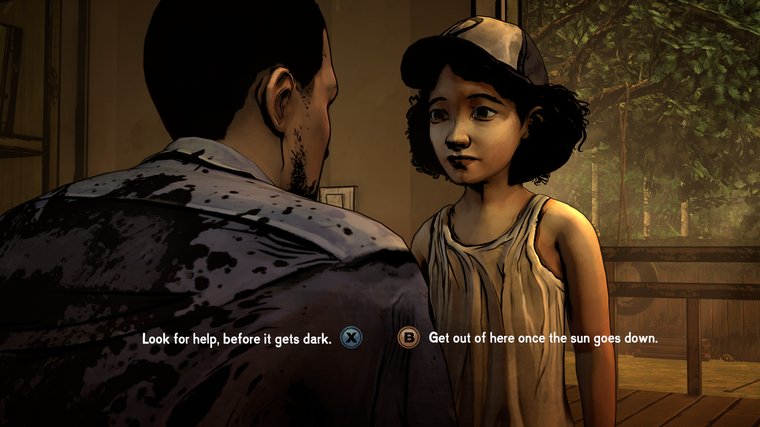
| Our Score | 9.5
☆
★
☆
★
☆
★
☆
★
☆
★
☆
★
☆
★
☆
★
☆
★
☆
★
|
| Platforms | PC, PlayStation 3, PlayStation 4, Xbox 360, Xbox One, iOS, Android, Nintendo Switch |
| Year of Release | 2012 |
| Creator/s | Telltale Games |
| Average Playtime | 12–15 hours |
| Metacritic Score | 82 (PC) |
Season One is an easy pick for this category because no other memorable zombie game nails emotional storytelling quite like it. Players still talk about the bond between Lee and Clementine more than ten years later, and for good reason. The game makes every choice feel heavy, like it could change everything, and that emotional punch is what put Telltale on the map.
Of course, it is not flawless. Fans often mention the stiff animations and the occasional technical hiccup, and it is true that the “your choices matter” tagline is a little overstated since the big story beats mostly stay the same. But honestly, the weight of those decisions still hits you where it counts.
The gameplay itself is simple, mostly dialogue choices, a few puzzles, and some quick-time events. That might sound limited, but it actually works perfectly for this kind of story. You are not supposed to be mowing down zombies nonstop, you are supposed to feel what it is like to survive through trust, sacrifice, and impossible decisions. The comic-inspired visuals still hold up, too. They give the whole game a timeless look that keeps it tied to the original graphic novels.
What makes Season One special is how much it sticks with you. It is not the kind of game you just play and move on from. It leaves you thinking about the choices you made and the people you tried to protect.
My Verdict: This is where Clementine’s journey begins, and it remains the emotional backbone of the entire franchise. A masterpiece of interactive storytelling, The Walking Dead: Season One is essential for anyone diving into the series.
2. The Walking Dead: 400 Days [Best Short Storytelling Experience]
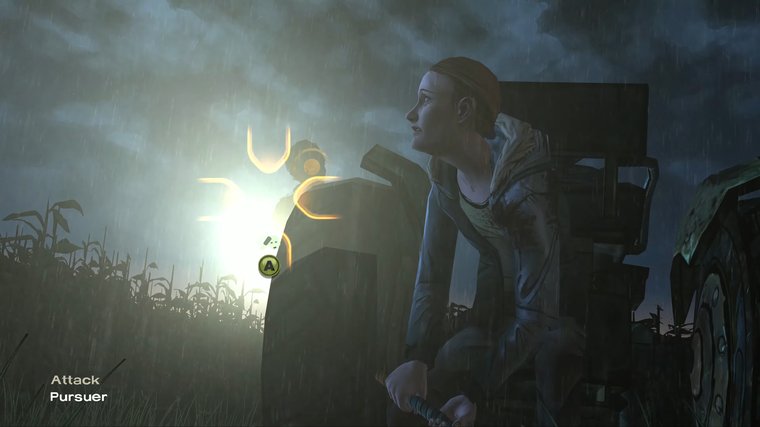
| Our Score | 8.5
☆
★
☆
★
☆
★
☆
★
☆
★
☆
★
☆
★
☆
★
☆
★
☆
★
|
| Platforms | PC, PlayStation 3, PlayStation 4, Xbox 360, Xbox One, iOS, Android, Nintendo Switch |
| Year of Release | 2013 |
| Creator/s | Telltale Games |
| Average Playtime | 2–3 hours |
| Metacritic Score | 78 (PC) |
This DLC earns its spot because no other entry shows off short-form storytelling quite like 400 Days. Instead of one lead, you jump between five different survivors, each with their own perspective during the first 400 days of the outbreak. It feels like a set of mini-episodes, all tied together by subtle connections that eventually link into Season Two.
Players praise how tight and focused the writing is, with some of the most intense moral choices packed into a short runtime. On the flip side, the biggest complaint is that it feels too short, and some characters don’t get the depth they deserve. A lot of fans walked away wanting more from certain storylines.
Gameplay is the same Telltale formula you know: dialogue choices, quick-time events, and light exploration. What makes it special is how quickly it pulls you into each character’s world. Even in a 20-minute chapter, you feel the tension of survival and the weight of every decision. The comic-inspired art style returns, and it keeps that gritty but stylized feel that makes the series stand out.
Personally, I think 400 Days is underrated. It is not as sweeping as a full season, but the variety of perspectives makes it fascinating. You get a real sense of how different people cope when the world ends, and that variety adds a lot to the universe.
This DLC is also often recommended in lists of the best horror games because of how effectively it delivers tension and atmosphere in such a compact runtime.
My Verdict: Perfect for players craving more Walking Dead content without the commitment of a full season. 400 Days packs powerful storytelling into a shorter experience that still hits emotionally.
3. The Walking Dead: Season Two [Best Character Growth in the Series]
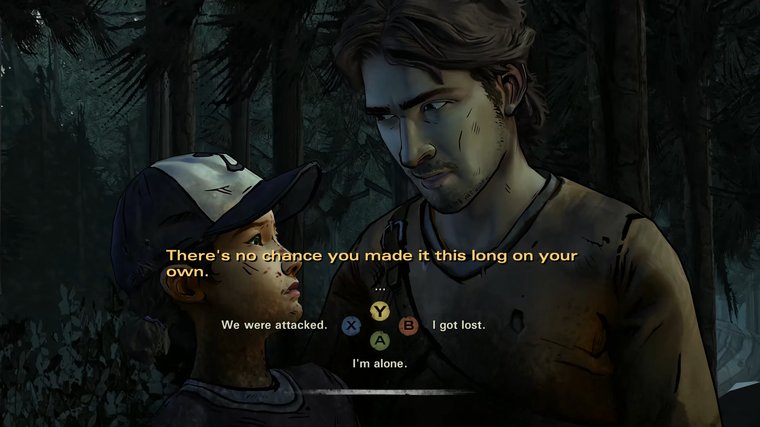
| Our Score | 8.5
☆
★
☆
★
☆
★
☆
★
☆
★
☆
★
☆
★
☆
★
☆
★
☆
★
|
| Platforms | PC, PlayStation 3, PlayStation 4, Xbox 360, Xbox One, iOS, Android, Nintendo Switch |
| Year of Release | 2013 |
| Creator/s | Telltale Games |
| Average Playtime | 12–14 hours |
| Metacritic Score | 80 (PC) |
Season Two stands out because it puts you directly in Clementine’s shoes, and few games capture character growth as powerfully as this one. Watching her step out of Lee’s shadow and try to survive on her own makes every decision feel heavier and more personal. Players often say this season hits harder emotionally because you are no longer protecting Clementine — you are becoming her.
The strengths are clear. The writing is darker and more brutal, with high-stakes moments that force you to make impossible calls. The emotional weight of playing as a child in a collapsing world is something few games have even attempted. On the other hand, some fans feel that the supporting cast is less memorable than in Season One and that the story doesn’t always hit the same highs. A few even argue that the illusion of choice feels thinner here.
Gameplay is the familiar Telltale formula: dialogue options, quick-time events, and short exploration sections. The art style remains faithful to the comic-inspired look, which gives the world a gritty, stylized edge that keeps the immersion strong. Experiencing the detailed environments and subtle character animations is best appreciated on a high-quality display, which is why many players pair the game with a top gaming monitor for the full visual experience.
This season is special because this is where the series proved it wasn’t just a one-off success. It may not have quite the magic of the original, but it pushes Clementine’s journey forward in ways that stick with you long after you put the controller down.
My Verdict: Season Two elevates The Walking Dead experience with mature themes, tough decisions, and a strong emotional core. Players who loved the first season will find themselves fully invested in Clementine’s journey and the haunting world she navigates.
4. The Walking Dead: Survival Instinct [Most Disappointing Spin-Off]
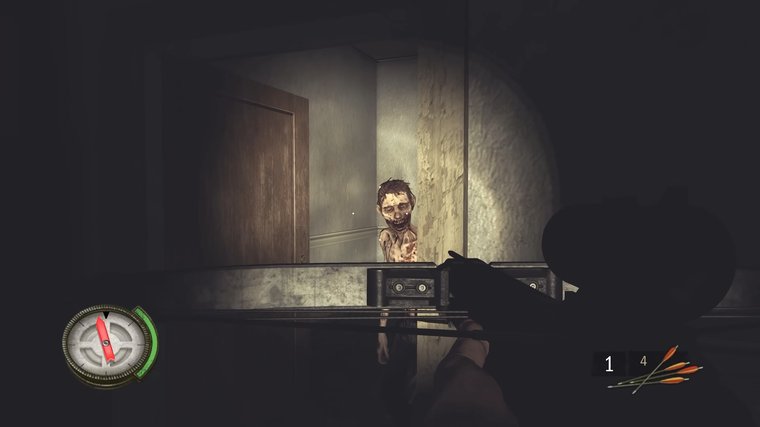
| Our Score | 5.5
☆
★
☆
★
☆
★
☆
★
☆
★
☆
★
☆
★
☆
★
☆
★
☆
★
|
| Platforms | PC, PlayStation 3, Xbox 360 |
| Year of Release | 2013 |
| Creator/s | Terminal Reality |
| Average Playtime | 6–8 hours |
| Metacritic Score | 32 (PC) |
It makes sense to nominate Survival Instinct as Most Disappointing Spin-Off because while the idea of playing as fan-favorite Daryl Dixon sounded exciting, the end product failed to meet expectations. On paper, it promised scavenging, resource management, and gritty stealth-based survival. In practice, the game struggled with repetitive missions, awkward mechanics, and visuals that felt outdated even for its time.
What the game does get right is the atmosphere. Playing as Daryl does add a certain gritty authenticity, and there are moments when stealth kills or limited ammo create real tension. Fans appreciated the chance to explore his early story alongside Merle, and the survival elements, scavenging gas, food, and ammo, do reinforce that constant feeling of desperation, which is why it’s often mentioned among notable survival games.
But the issues are hard to ignore. Combat feels clunky, AI walkers are often predictable, and level design is linear rather than the open-ended experience many players had hoped for. Critics frequently pointed out how it didn’t live up to the emotional depth of Telltale’s series or the polish of other action-survival titles. Personally, I found that while a few tense encounters had potential, the game as a whole lacked the polish and variety to stay engaging.
My Verdict: Survival Instinct is worth checking out only if you’re a die-hard Walking Dead fan curious about Daryl’s backstory. There are flashes of tension and some enjoyable stealth moments, but the repetitive design and technical rough edges make it one of the weakest entries in the franchise.
5. The Escapists: The Walking Dead [Best Creative Crossover]
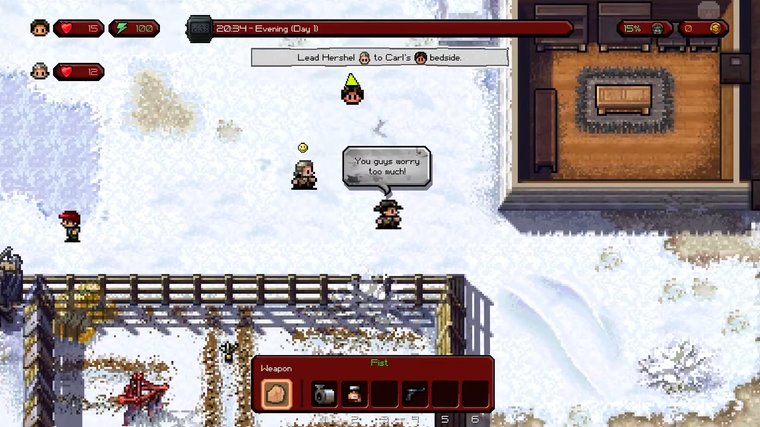
| Our Score | 7.5
☆
★
☆
★
☆
★
☆
★
☆
★
☆
★
☆
★
☆
★
☆
★
☆
★
|
| Platforms | PC, PlayStation 4, Xbox One, PlayStation Vita |
| Year of Release | 2015 |
| Creator/s | Team17, Mouldy Toof Studios |
| Average Playtime | 10–12 hours |
| Metacritic Score | 65 (PC) |
This game earns its nomination as Best Creative Crossover because it takes the sandbox puzzle mechanics of The Escapists and blends them surprisingly well with The Walking Dead’s world. Instead of running and gunning your way through walkers, you’re tasked with plotting elaborate prison breaks while keeping your group alive. It’s a quirky but fitting twist on the franchise.
Players control Rick and other familiar characters like Michonne, Glenn, and Carl, each helping to carry out strategic escapes from locations overrun by zombies. The mix of crafting tools, managing resources, and sneaking around walkers creates tense but rewarding gameplay. I especially liked how you’re forced to think several moves ahead, a lockpick or shovel can mean the difference between freedom and becoming a walker chow.
On the positive side, fans praised the clever integration of the comic’s storyline into the escape-based gameplay. It’s challenging, strategic, and feels different from any other Walking Dead title.
If you’re into planning and methodical strategy, it even shares some DNA with the best tactical RPGs thanks to its focus on smart resource use and long-term decision-making. The retro-inspired visuals are charming and surprisingly effective at building atmosphere, though I’d admit they won’t appeal to everyone.
Where the game stumbles is in repetition. Missions can sometimes feel grindy, and the difficulty spikes may frustrate players not used to planning every move with precision. Combat is also pretty barebones, which fits the game’s survival focus but might disappoint those expecting more action. Personally, I found it refreshing as a slower, more methodical take on the apocalypse, but I can see why some players bounced off the trial-and-error loop.
My Verdict: I’d say this game is a refreshing twist on the Walking Dead universe. It’s strategic, challenging, and surprisingly fun to coordinate escapes while avoiding hordes of zombies.
6. The Walking Dead: No Man’s Land [ Best Mobile Strategy Experience]
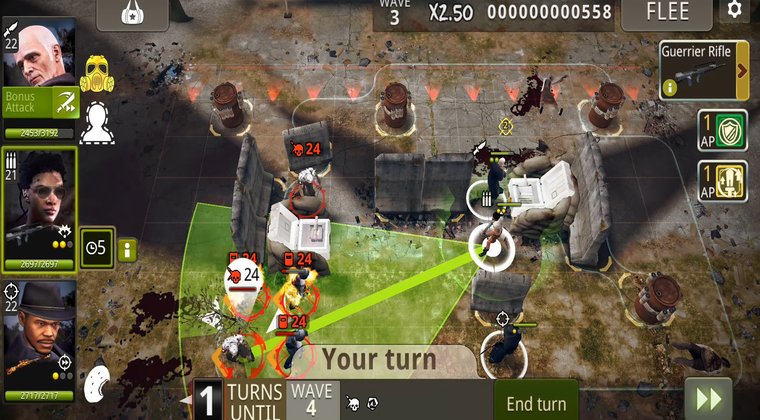
| Our Score | 8
☆
★
☆
★
☆
★
☆
★
☆
★
☆
★
☆
★
☆
★
☆
★
☆
★
|
| Platforms | PC, iOS, Android |
| Year of Release | 2015 |
| Creator/s | Next Games |
| Average Playtime | 15–20 hours |
| Metacritic Score | 74 (iOS) |
I gave No Man’s Land the nod for Best Mobile Strategy Experience because it’s one of the few Walking Dead games that actually nails the strategy genre on phones. Most mobile spin-offs feel like watered-down cash grabs, but this one surprised me with how tactical and addictive it can be.
You’re put in charge of building a survivor camp, recruiting fighters, and sending them out on missions that mix turn-based strategy with the constant pressure of the apocalypse. What really sold me is how recognizable the world feels. Running into Daryl or Michonne instantly reminded me of the show, and the missions often mirror locations fans will instantly recognize. It’s a neat blend of TV tie-in and game mechanics.
Players praise the way combat makes you think about positioning, overwatch attacks, and timing. Sending the wrong survivor into a fight can spell disaster, so upgrading your team and crafting better weapons actually matters. I found myself hooked on the loop of training survivors, getting them stronger, and testing them against tougher missions.
Of course, there are some drawbacks. Like a lot of mobile games, No Man’s Land leans on grind and timers. You’ll eventually hit moments where you either repeat missions endlessly or get nudged toward spending real money to speed things up. Personally, I found it best enjoyed in shorter bursts, great for bus rides or waiting in line, not so much for marathon gaming sessions.
My Verdict: If you’re a Walking Dead fan who also enjoys strategy games, No Man’s Land is worth downloading. It’s got enough depth to keep you thinking, enough fan service to make you smile, and enough mobile convenience to fit easily into your day. Just be ready for some grind along the way.
7. The Walking Dead: Road to Survival [Most Ambitious (but Flawed) Mobile Entry]
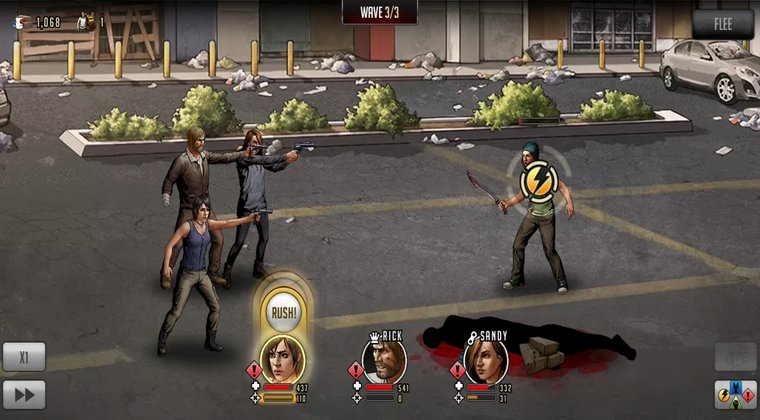
| Our Score | 7.5
☆
★
☆
★
☆
★
☆
★
☆
★
☆
★
☆
★
☆
★
☆
★
☆
★
|
| Platforms | iOS, Android |
| Year of Release | 2015 |
| Creator/s | IUGO Mobile Entertainment / Scopely |
| Average Playtime | 10–20 hours (story + PvP) |
| Metacritic Score | 73 |
Among all The Walking Dead mobile titles, Road to Survival probably went the furthest in trying to give players “the full package.” You weren’t just fighting zombies, you were running a base, gathering supplies, training survivors, and making choices that shaped the story. The turn-based combat added real tension, with each survivor’s unique abilities making or breaking a fight. And the comic-style visuals tied it back to the original graphic novels in a way that felt authentic.
For many players, that ambition was both the game’s biggest draw and its biggest downfall. The deeper you got, the more the aggressive monetization kicked in. Unlocking powerful survivors usually meant throwing yourself at the gacha system, and competitive PvP often felt like it rewarded spending more than skill. The community loved the characters and story beats, but the pay-to-win grind left a sour aftertaste.
The servers were officially shut down in 2024, which means you can’t experience it anymore, even if you wanted to. Looking back, Road to Survival feels like a game ahead of its time in some ways, offering complex tactical decisions and base management that still rank it among notable strategy games.
My Verdict: Not playable anymore, but still remembered. For some, it was a gripping survival strategy experience. For others, it was a wallet-draining grind. Either way, it left its mark as one of the most ambitious Walking Dead mobile games ever made.
8. The Walking Dead: Michonne [Most Personal Storyline]
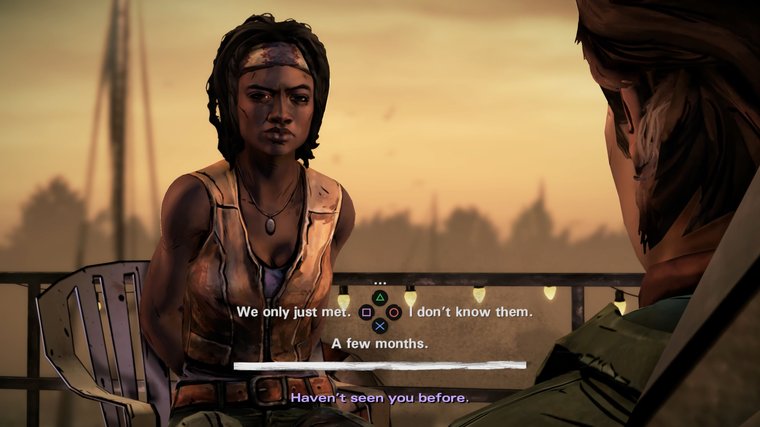
| Our Score | 8.5
☆
★
☆
★
☆
★
☆
★
☆
★
☆
★
☆
★
☆
★
☆
★
☆
★
|
| Platforms | PC, PlayStation 3, PlayStation 4, Xbox 360 & Xbox One, iOS, Android |
| Year of Release | 2016 |
| Creator/s | Telltale Games |
| Average Playtime | 4–6 hours |
| Metacritic Score | 67 |
This nomination makes perfect sense because Michonne’s miniseries is less about the zombie threat and more about her – her grief, her regrets, and the psychological weight she carries. Out of all the Telltale entries, it feels the most intimate, as though you’re finally invited behind the mask of one of the franchise’s most iconic survivors.
Gameplay sticks to Telltale’s well-known formula of branching dialogue, quick-time events, and moral choices, but here it’s wrapped around Michonne’s fractured inner life. The comic-book aesthetic keeps that graphic novel atmosphere alive, and the combat, while limited, adds enough tension to keep you on edge. Playing on a reliable gaming laptop ensures smooth performance and lets you fully appreciate the visual storytelling.
Some dialogue options seem minor, but they change how other characters treat Michonne later. If you want the best emotional payoff, stay consistent with her personality choices.
I personally liked how raw this story felt compared to the larger Telltale seasons. The pacing is tight, the emotions hit harder, and the short runtime actually works in its favor by avoiding filler. Still, players have pointed out that some choices feel less impactful than in Season One or Two, and the three-episode format left them wanting more depth.
My Verdict: It’s not the most polished or expansive Telltale title, but it delivers a powerful, personal snapshot of a beloved character. If you enjoy story-driven adventures that put emotions first, this one’s absolutely worth experiencing.
9. The Walking Dead: A New Frontier [Best Family-Driven Storyline]
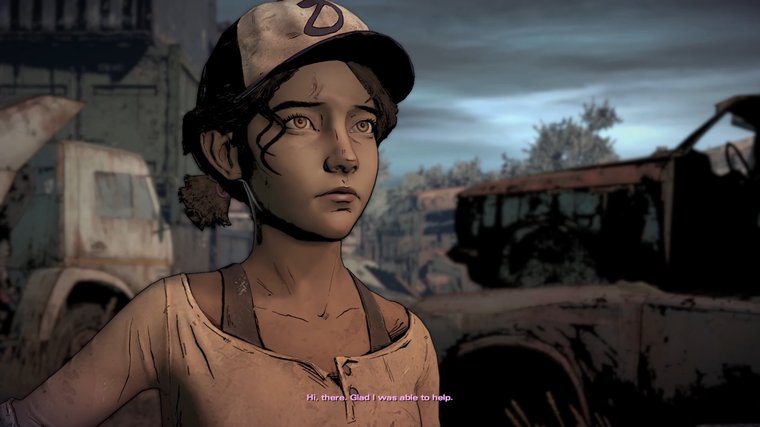
| Our Score | 8.5
☆
★
☆
★
☆
★
☆
★
☆
★
☆
★
☆
★
☆
★
☆
★
☆
★
|
| Platforms | PC, PlayStation 4, Xbox One, iOS, Android, Nintendo Switch |
| Year of Release | 2016 |
| Creator/s | Telltale Games |
| Average Playtime | 8–10 hours |
| Metacritic Score | 69 |
This nomination fits because A New Frontier shifts the spotlight from Clementine to Javier, a former baseball player turned reluctant leader trying to keep his fractured family together. Unlike earlier seasons that focused mostly on survival, this one really dives into family bonds and the price of loyalty.
Personally, I liked how A New Frontier felt a little faster-paced than Season Two. The action hits harder, and the new cast, especially Javier and Kate, keep things fresh. That said, many players felt Clementine was sidelined too much, with her story sometimes feeling secondary despite being the series’ emotional anchor. Others criticized some choices for not having the long-term weight of earlier games.
Even with those drawbacks, the focus on family makes A New Frontier stand out. It’s less about surviving the apocalypse as a lone wolf and more about holding together the people who matter most when everything falls apart.
My Verdict: If you’re invested in The Walking Dead universe, this chapter is worth playing. It may not hit the same emotional heights as Season One, but it delivers a strong, family-centered narrative with plenty of tension and difficult choices that keep you hooked.
10. Fear the Walking Dead: Dead Run [Best Mobile Spin-Off]
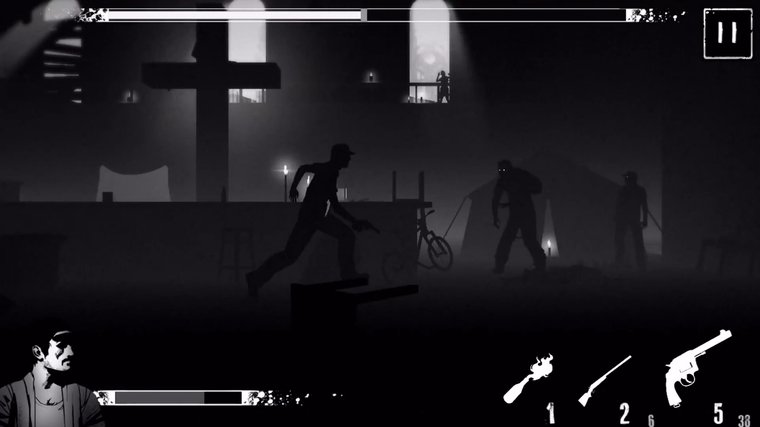
| Our Score | 8.0
☆
★
☆
★
☆
★
☆
★
☆
★
☆
★
☆
★
☆
★
☆
★
☆
★
|
| Platforms | iOS, Android |
| Year of Release | 2016 |
| Creator/s | Versus Evil / AMC |
| Average Playtime | 5–7 hours (casual play) |
| Metacritic Score | TBD |
When Fear the Walking Dead: Dead Run launched, it felt like one of the smarter attempts to bring the franchise to mobile. Instead of being just another endless runner, it mixed fast-paced dodging and swiping with survival elements like resource collection and survivor upgrades. That blend of reflex-based action with light strategy gave the game a unique edge and earned it a dedicated fan base for a while.
What really worked here was how well it captured the tone of the Fear the Walking Dead TV series. The gritty but colorful visuals, combined with frantic pacing and sudden zombie ambushes, made every run feel tense. Players also praised the team upgrade system, which let you scavenge better gear and improve survivors, keeping the loop from feeling repetitive too quickly.
That said, it wasn’t without flaws. Like many mobile games of its time, it leaned heavily into monetization – frequent prompts to spend money on upgrades or boosts frustrated a lot of players. And despite its smart ideas, some felt the mechanics still grew repetitive after a few hours of play.
Unfortunately, the game was eventually delisted and is no longer available for download, which makes it more of a relic of its time than a current option.
My Verdict: Dead Run stood out for giving the runner genre a Walking Dead twist with real tension and light strategy, but its aggressive monetization and eventual delisting cut its life short. If you missed it back then, you can’t officially grab it anymore, but it remains a fun “what if” experiment in mobile survival gaming.
11. The Walking Dead: The Final Season [Saying Goodbye to Clementine]
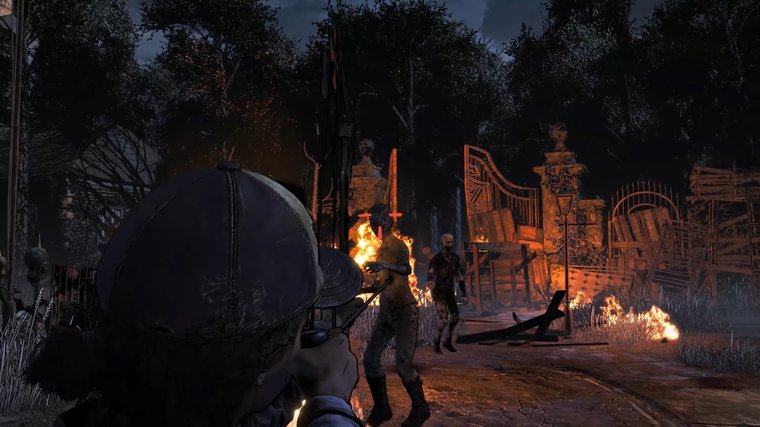
| Our Score | 9.0
☆
★
☆
★
☆
★
☆
★
☆
★
☆
★
☆
★
☆
★
☆
★
☆
★
|
| Platforms | PC, PS4, Xbox One, Switch |
| Year of Release | 2018 |
| Creator/s | Telltale Games / Skybound Games |
| Average Playtime | 10–12 hours |
| Metacritic Score | 77 |
If you’ve been with Clementine since the very first season, playing The Final Season feels like closing a chapter in your own gaming life. Taking on the role of Clem as she raises AJ is not just about dodging walkers or bartering for food. It is about shaping a child in a broken world, and honestly, that hit me harder than I expected. Every decision carried the weight of not only survival but also the future you’re building for AJ.
The art style has always been one of Telltale’s trademarks, but here it really shines. The comic-inspired look is sharper, the lighting more cinematic, and the environments, from shadowy forests to the hauntingly quiet school, immerse you in both beauty and despair. I remember pausing a few times just to soak in how atmospheric it all felt.
Of course, it’s not perfect. Some players point out that AJ’s morality system doesn’t always reflect your choices consistently, and the pacing in the middle episodes can feel uneven. But for me, those moments never outweighed the emotional payoff. By the time the credits rolled, I felt a mix of heartbreak, relief, and gratitude that Clementine’s journey got the closure it deserved.
My Verdict: If you’ve followed Clementine from the beginning, The Final Season is the conclusion of a story you’ve been part of for years. It’s raw, emotional, and unforgettable. And when it ended, I realized I was saying goodbye to a piece of my own gaming history.
12. The Walking Dead: Our World [The Apocalypse in Your Backyard]
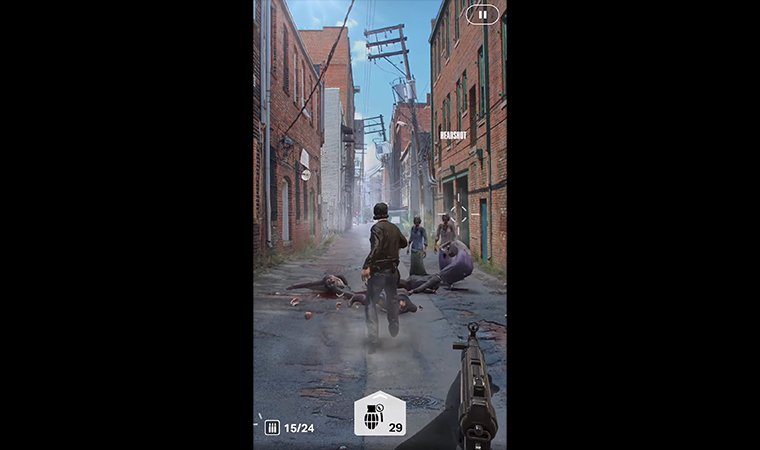
| Our Score | 7.5
☆
★
☆
★
☆
★
☆
★
☆
★
☆
★
☆
★
☆
★
☆
★
☆
★
|
| Platforms | iOS, Android |
| Year of Release | 2018 |
| Creator/s | Next Games |
| Average Playtime | Ongoing / session-based |
| Metacritic Score | TBD |
What if the zombie apocalypse spilled right onto your block? The Walking Dead: Our World takes that idea and runs with it, using AR to transform your surroundings into zombie-infested battlegrounds. One moment you’re walking to grab groceries, and the next you’re blasting walkers outside your local café or scavenging supplies in the park. It’s an eerie but exhilarating feeling, like the show’s tension has bled into your everyday life.
Gameplay is refreshingly simple but hooks you quickly. Shooting down zombies in AR combat feels satisfying, especially when you manage to line up perfect shots while moving around. Rescuing survivors adds a purpose beyond just racking up kills, and upgrading your weapons and heroes like Rick, Michonne, and Daryl keeps things feeling fresh as you progress.
Players often praise how collecting iconic characters adds that “fan wish-fulfillment” vibe, though some also note that the grind for upgrades can feel a little repetitive after a while.
Visually, it strikes a good balance. The AR overlays are polished and clean, while the character models maintain just enough grit to remind you that this is The Walking Dead, not a casual shooter. It might not hit the cinematic highs of Telltale’s story-driven entries, but it nails the “play anywhere” promise better than any other Walking Dead title.
My Verdict: If you’ve ever wanted to feel like the apocalypse hit your own hometown, this game absolutely delivers. It’s not perfect, the upgrade system can drag, but as a bite-sized survival adventure you can carry in your pocket, it’s a fun and inventive twist on the franchise.
13. Overkill’s The Walking Dead [A Co-Op Vision Cut Short]
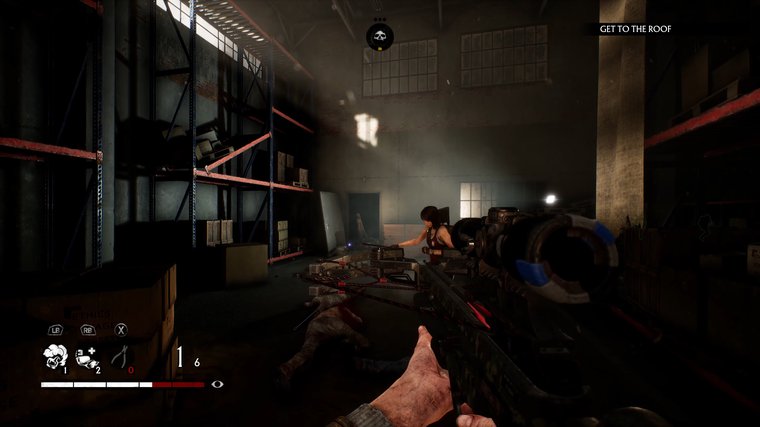
| Our Score | 7.0
☆
★
☆
★
☆
★
☆
★
☆
★
☆
★
☆
★
☆
★
☆
★
☆
★
|
| Platforms | PC |
| Year of Release | 2018 |
| Creator/s | Overkill Software |
| Average Playtime | 20–30 hours (campaign + co-op missions) |
| Metacritic Score | 51 (PC) |
Overkill’s The Walking Dead set out to reimagine the franchise as a gritty first-person co-op shooter, and at its best, it delivered some real tension. You’d team up with three other survivors, each with their own class and upgradable abilities, and dive into missions that demanded planning, stealth, and communication. It wasn’t just about mowing down walkers; one teammate might provide cover fire while another scouted for supplies, and that constant need for coordination gave the game an edge of realism.
The atmosphere was one of its strongest assets. Dark, oppressive environments paired with visceral combat effects made you feel the brutality of survival. When it worked, missions carried a tense energy that reminded me of Left 4 Dead but with more focus on resource management and camp-building.
Some players genuinely loved how the game rewarded teamwork and punished lone-wolf playstyles, but others found it clunky and uneven, with bugs and balancing issues that dulled the thrill.
Unfortunately, that promise didn’t last. The game suffered from a rocky launch, poor reviews, and dwindling player numbers. By 2019, it was delisted, and today, it’s officially shut down. Still, for anyone interested in first-person shooter action and cooperative gunplay, it remains a notable entry on lists of best FPS games.
For fans who prefer more reliable experiences, you’ll probably find better long-term satisfaction in titles from our list of the best single-player PC games, which offer the same kind of atmosphere without the frustration of server shutdowns.
My Verdict: Overkill’s The Walking Dead may no longer be playable, but it deserves recognition for what it tried to achieve. While it ultimately failed to stick the landing, it brought a unique team-based vision to the franchise that no other Walking Dead game has attempted at this scale.
14. The Walking Dead: The Telltale Definitive Series [The Ultimate Narrative Collection]
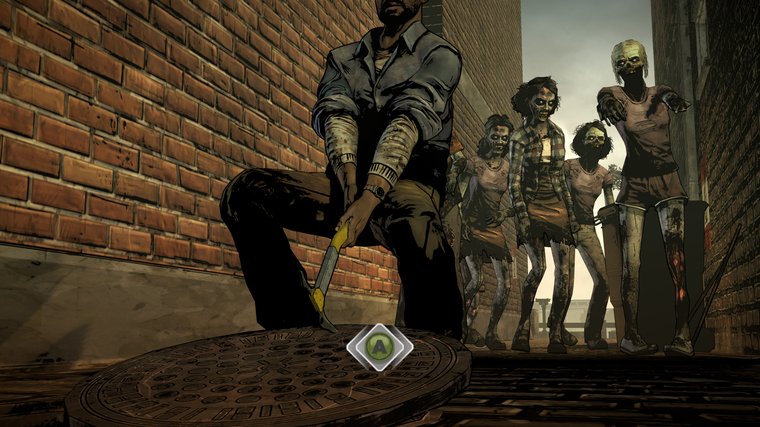
| Our Score | 9.0
☆
★
☆
★
☆
★
☆
★
☆
★
☆
★
☆
★
☆
★
☆
★
☆
★
|
| Platforms | PC, PS4, Xbox One |
| Year of Release | 2019 |
| Creator/s | Telltale Games / Skybound Games |
| Average Playtime | 50+ hours (all seasons & DLC) |
| Metacritic Score | 82 (PC) |
If there’s one collection that truly defines what The Walking Dead means to gaming, it’s this one. The Telltale Definitive Series compiles all four seasons, the 400 Days DLC, and The Walking Dead: Michonne into a single package, letting players experience Clementine’s story from start to finish. I’d nominate it for “Best Complete Narrative Experience” because it gives you the full arc from Clementine’s beginnings as a vulnerable child in Season One to her role as a hardened leader in The Final Season.
The remaster introduces the “Graphic Black” visual style, which sharpens the cel-shaded look into something that feels ripped straight from a comic panel. It’s moody, cinematic, and makes replaying older episodes feel fresh again. Alongside that, you also get extras like developer commentary, a music player, and behind-the-scenes features that longtime fans loved digging into.
Playing through the series back-to-back really emphasizes how consistent Telltale’s storytelling is, and the game’s clever puzzles and decision-making challenges make it not just a gripping narrative but also one of the most engaging puzzle games you can play. The emotional highs, like the gut-wrenching ending of Season One, hit just as hard years later, while quieter character moments still shine.
My Verdict: If you care about storytelling in games, this series is essential. It’s emotional, heartbreaking, and deeply human, the kind of journey that lingers long after you set down the controller.
15. The Walking Dead: Saints & Sinners [Best VR Survival Experience]
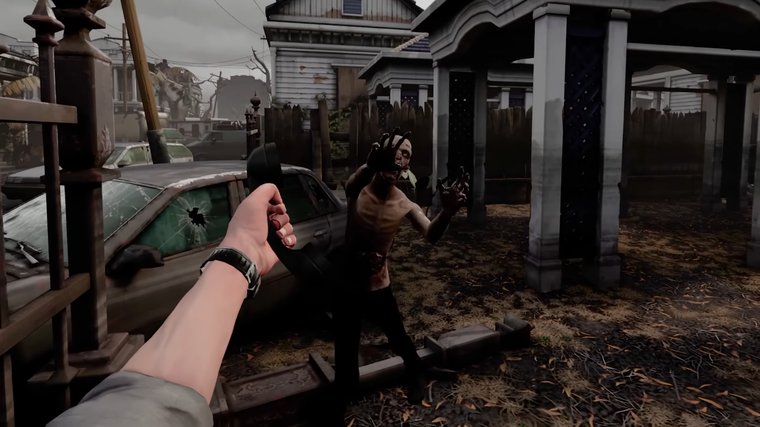
| Our Score | 9.5
☆
★
☆
★
☆
★
☆
★
☆
★
☆
★
☆
★
☆
★
☆
★
☆
★
|
| Platforms | PC (VR), PSVR, Meta Quest |
| Year of Release | 2020 |
| Creator/s | Skydance Interactive |
| Average Playtime | 15–20 hours (main story, side missions extend further) |
| Metacritic Score | 81 (PC VR) |
If I had to give this game a crown, it would easily be “Best VR Survival Experience.” The Walking Dead: Saints & Sinners doesn’t just let you watch the apocalypse, it drops you right in the middle of it, in the flooded ruins of New Orleans. Every decision feels weighty. Do you risk scavenging a dark, walker-infested house for food, or play it safe and miss out on gear you might desperately need? Do you help a pleading survivor, or turn your back knowing they might not return the favor later?
The combat is where the game really shines. Swinging a bat, driving a knife into a walker’s skull, or firing a shaky gunshot in VR has a physicality that’s both thrilling and terrifying. I’ve played plenty of survival games, but this one genuinely made me tense up in ways few others have. The resource management and base upgrades give it a grounded strategy layer, almost brushing up against the design of sandbox-style survival games, though here, it’s all wrapped in VR intensity.
What I loved most was how alive the world felt. The rain-soaked streets, abandoned churches, and flooded neighborhoods aren’t just backdrops, they set the mood, making every scavenging run feel like a story in itself. A lot of players praised that immersion, saying it was the first VR game that truly made them feel like they were living the apocalypse.
That said, others pointed out the controls could feel clunky at times, and not everyone loved the stamina system that made combat exhausting if you weren’t careful. Still, most agree it’s one of the most unforgettable VR games out there.
On top of that, the RPG-like progression leveling skills, crafting weapons, and deciding how to play your character put it shoulder to shoulder with some of the best action RPG games. It’s not just about swinging weapons; it’s about shaping your own survival story.
My Verdict: For me, Saints & Sinners is the closest gaming has come to simulating the raw, desperate fight for survival in The Walking Dead universe. It’s brutal, emotional, and shockingly immersive. If you own a VR headset, this is the game that makes it all worth it.
16. The Walking Dead: Onslaught [Best VR Spin-off Adaptation]
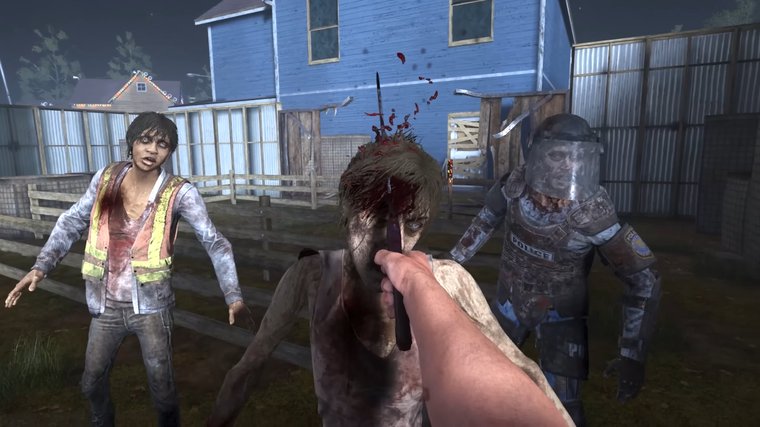
| Our Score | 7.5
☆
★
☆
★
☆
★
☆
★
☆
★
☆
★
☆
★
☆
★
☆
★
☆
★
|
| Platforms | PC (VR), PSVR |
| Year of Release | 2020 |
| Creator/s | Survios |
| Average Playtime | 7–10 hours |
| Metacritic Score | 61 |
Unlike Saints & Sinners, which immerses you in an original survivor’s tale, Onslaught takes a different route by letting you step directly into the shoes of Rick, Daryl, Michonne, and other TV show legends. That’s its biggest draw, there’s a certain thrill in swinging Daryl’s crossbow or hacking through walkers as Michonne that instantly connects fans of the series to the game.
The gameplay leans heavily into arcade-style VR combat. Supply runs and base-building at Alexandria give the story a bit of structure, but the heart of the experience is action, brutal, fast-paced, and over-the-top. Swinging melee weapons or unloading ammo into hordes is undeniably fun in short bursts, even if the mechanics sometimes feel repetitive. Rebuilding Alexandria adds another layer of immersion, offering fans the fantasy of restoring one of the show’s most iconic safe havens.
Where Onslaught stumbles is polish. Visuals are serviceable but lack the realism and atmosphere of Saints & Sinners, and performance can dip during more chaotic sequences. Player feedback often highlights this imbalance: fans praise the chance to play as beloved characters and enjoy the cathartic combat, and for those who love teaming up with friends, it’s considered one of the better co-op games in the VR Walking Dead lineup.
My Verdict: Onslaught won’t replace Saints & Sinners as the definitive Walking Dead VR experience, but if you’re looking for quick, satisfying combat and the joy of playing as your TV heroes, it’s worth picking up. Sometimes, smashing through hordes as Daryl is all the excuse you need.
17. The Walking Dead: Survivors [Best Mobile Strategy Survival]
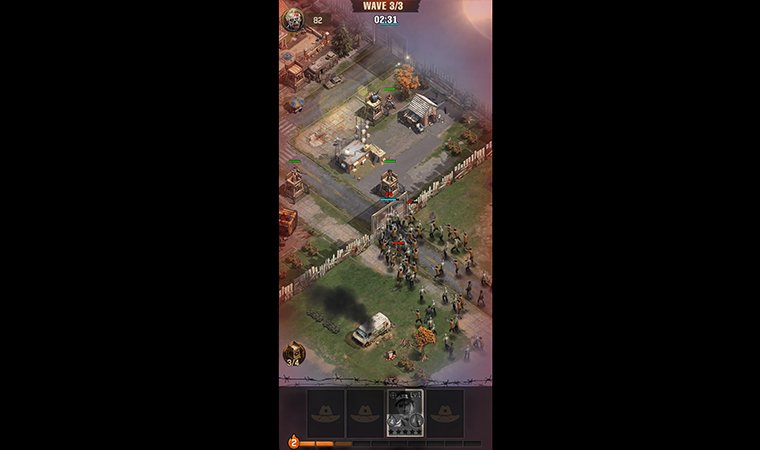
| Our Score | 8.0
☆
★
☆
★
☆
★
☆
★
☆
★
☆
★
☆
★
☆
★
☆
★
☆
★
|
| Platforms | iOS, Android |
| Year of Release | 2021 |
| Creator/s | Elex / Galaxy Play Technology |
| Average Playtime | Ongoing (MMO progression) |
| Metacritic Score | TBD |
If you’ve ever wondered what it would be like to run your own survivor community in the walker apocalypse, The Walking Dead: Survivors pretty much hands you the keys. Instead of following one character’s story like in the VR games, here you’re in charge of everyone: building your base, training survivors, and trying to keep your people alive while fending off both zombies and other players.
What I love about it is how much strategy actually matters. Every choice, where to upgrade, who to send on raids, which alliances to make, can totally change how your settlement fares. I’ve had moments where a sudden walker attack had me scrambling, and watching my carefully built defenses hold up felt genuinely satisfying. The comic-inspired graphics give it a unique look that’s colorful and approachable, but it still keeps that grim, tense vibe of the show.
Other players really seem to enjoy the mix of survival and PvP competition. Some have mentioned the grind can be a bit long, especially when you’re building alliances or leveling up, but the sense of progression and seeing your community grow keeps it addictive. Personally, I found myself checking in daily, just to see how my survivors were doing, and planning the next big move became almost like a habit.
My Verdict: If you enjoy outsmarting others while keeping your settlement alive, Survivors is surprisingly fun and rewarding. For fans of competitive mobile strategy who also love The Walking Dead, this one’s definitely worth picking up.
18. The Walking Dead: All-Stars [Best Mobile Hero-Collection RPG]
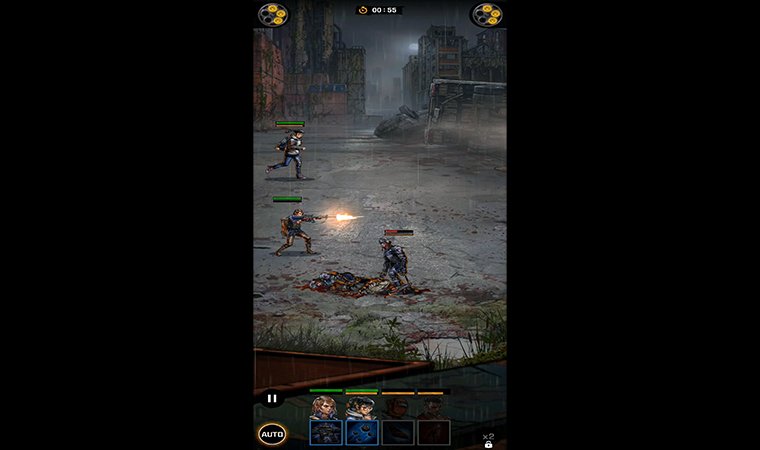
| Our Score | 8.0
☆
★
☆
★
☆
★
☆
★
☆
★
☆
★
☆
★
☆
★
☆
★
☆
★
|
| Platforms | iOS, Android |
| Year of Release | 2022 |
| Creator/s | Com2uS Holdings |
| Average Playtime | Ongoing (RPG progression) |
| Metacritic Score | TBD |
If you’ve ever loved assembling a team of heroes and watching them kick zombie butt, The Walking Dead: All-Stars scratches that itch perfectly. Unlike other Walking Dead mobile games, this one focuses on hero collection and RPG-style progression. You recruit both fan-favorite survivors and original characters, then strategically build teams to take on waves of walkers and rival enemies.
I really enjoyed how the game leans into comic-inspired visuals. The character portraits pop off the screen, and battle animations feel dramatic without being overcomplicated. While combat is partly automated, there’s enough depth in choosing hero combinations, leveling them up, and managing resources to keep things engaging.
Players I’ve talked to love the hero collection aspect. Some mention the occasional frustration with waiting for certain upgrades, but most agree that the thrill of seeing their favorite characters grow and dominate in battles outweighs the slow moments. Personally, I found myself experimenting with different team setups, trying out heroes I hadn’t expected to enjoy, and surprisingly, it kept me coming back.
My Verdict: For anyone who loves strategy, hero collection, and the gritty-but-colorful world of The Walking Dead: All-Stars delivers. It’s satisfying, accessible, and has enough depth to keep both casual and hardcore fans coming back.
19. The Walking Dead: Saints & Sinners – Chapter 2: Retribution [Best VR Survival Horror Experience]
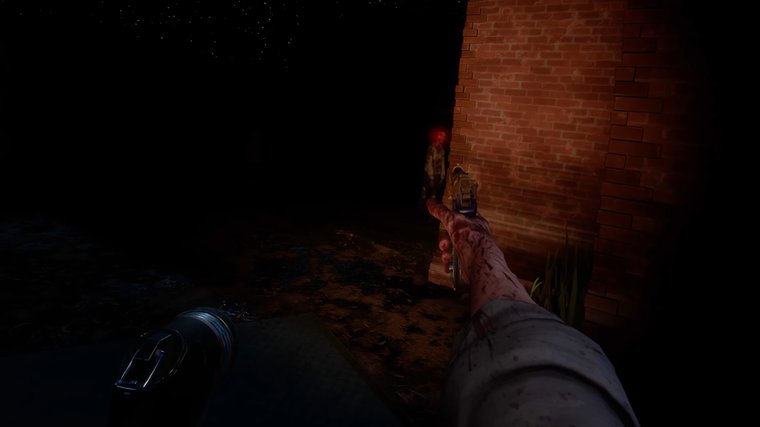
| Our Score | 8.5
☆
★
☆
★
☆
★
☆
★
☆
★
☆
★
☆
★
☆
★
☆
★
☆
★
|
| Platforms | PC (VR), PS VR2, Meta Quest 2, PICO 4 |
| Year of Release | 2022 |
| Creator/s | Skydance Interactive |
| Average Playtime | 15–25 hours |
| Metacritic Score | 72 (PC VR) |
If the first Saints & Sinners had you gripping your VR controllers, Chapter 2: Retribution will have you practically sweating. Returning to a walker-infested New Orleans, this sequel ups the ante with heavier weapons, more freedom, and choices that actually feel like they matter.
From scavenging for supplies to crafting makeshift gear, every decision can change your survival story. The combat is a standout for me, swinging an axe or shoving a walker in VR feels raw, weighty, and sometimes uncomfortably real. Combined with the branching storylines, I often found myself pausing to think, “Do I really want to take this risk?” It’s a level of immersion that makes the stakes feel personal, not just another game.
Other players I’ve chatted with rave about the atmosphere. New Orleans feels alive and dangerous, and the tension keeps building whether you’re sneaking through flooded streets or facing down a horde in tight quarters. Some even say it’s the best VR survival horror they’ve played because it blends strategy, physicality, and storytelling seamlessly. Personally, I kept returning to see how my choices would play out, and the variety of outcomes kept me hooked.
My Verdict: If you want a VR game that makes your palms sweat, this is it. Saints & Sinners: Chapter 2 doesn’t just give you zombies to kill, it drops you into a desperate world and asks how far you’re willing to go to survive.
20. The Walking Dead: Destinies [Best Interactive Narrative Experience]
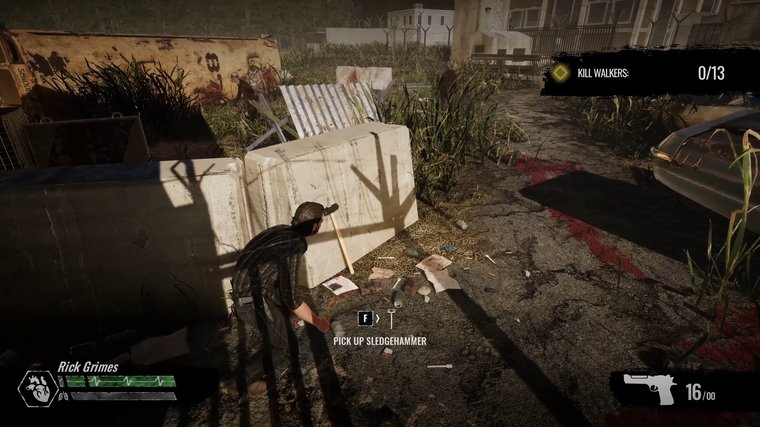
| Our Score | 7.5
☆
★
☆
★
☆
★
☆
★
☆
★
☆
★
☆
★
☆
★
☆
★
☆
★
|
| Platforms | PC, PS4, PS5, Xbox One, Xbox Series X/S, Nintendo Switch |
| Year of Release | 2023 |
| Creator/s | Flux Games |
| Average Playtime | 12–18 hours |
| Metacritic Score | 29 (PS5) |
If you’ve ever sat on your couch yelling at The Walking Dead TV show, wishing you could steer Rick or make a different choice, Destinies gives you that power. From waking up in the hospital as Rick Grimes, the game lets you explore “what if” scenarios that can drastically change who survives and who leads. Want Shane in charge instead of Rick? You can make that happen, and the ripple effects on the group make every decision feel weighty.
The gameplay blends third-person combat, resource scavenging, and moral decision-making. Combat itself is fairly straightforward, letting you swap between guns, melee weapons, and careful ammo management, but the real hook is shaping the story.
I loved testing different choices to see how the group dynamics shifted and which moments you can completely rewrite. Other players have shared similar excitement, noting that even small decisions can snowball into intense consequences that keep you invested in every scene.
My Verdict: If you’ve ever yelled at your screen during the show thinking, “I would’ve done that differently,” this is your chance to prove it. Destinies might not reinvent the survival genre, but it delivers on the fantasy of reshaping one of TV’s most famous zombie stories.
FAQs
What is the best The Walking Dead game?
The best Walking Dead game is often considered Telltale’s The Walking Dead: Season One. Its emotional storytelling, character development, and ties to the Walking Dead comics make it a standout video game experience. Many fans still rank it higher than later seasons and the miniseries game.
Which game is the first The Walking Dead game?
The first The Walking Dead game is The Walking Dead: Season One, released in 2012. This adventure game introduced players to Clementine and Lee, setting up the emotional journey that future titles expanded on. Its success influenced the second season and every previous title in the franchise.
What is the easiest The Walking Dead game?
The easiest The Walking Dead game is the PC version of the first season, thanks to simple controls and clear prompts. Unlike later entries like the third season or final game, its focus is on story choices instead of difficult mechanics, making it very beginner-friendly.
What The Walking Dead do I play first?
You should start with the first season since it introduces the main characters and storyline. Playing in order helps you follow Clementine’s growth across previous seasons, the second season, the third season, and eventually the final game without missing key character development or unexplained connected world details.
How many seasons are in The Walking Dead game in order?
There are four main seasons in the Walking Dead game series: the first season, the second season, the third season (A New Frontier), and the final game (The Final Season). Alongside these, there’s also the miniseries game (Michonne), which connects with the unexplained connected world of The Walking Dead comics.



